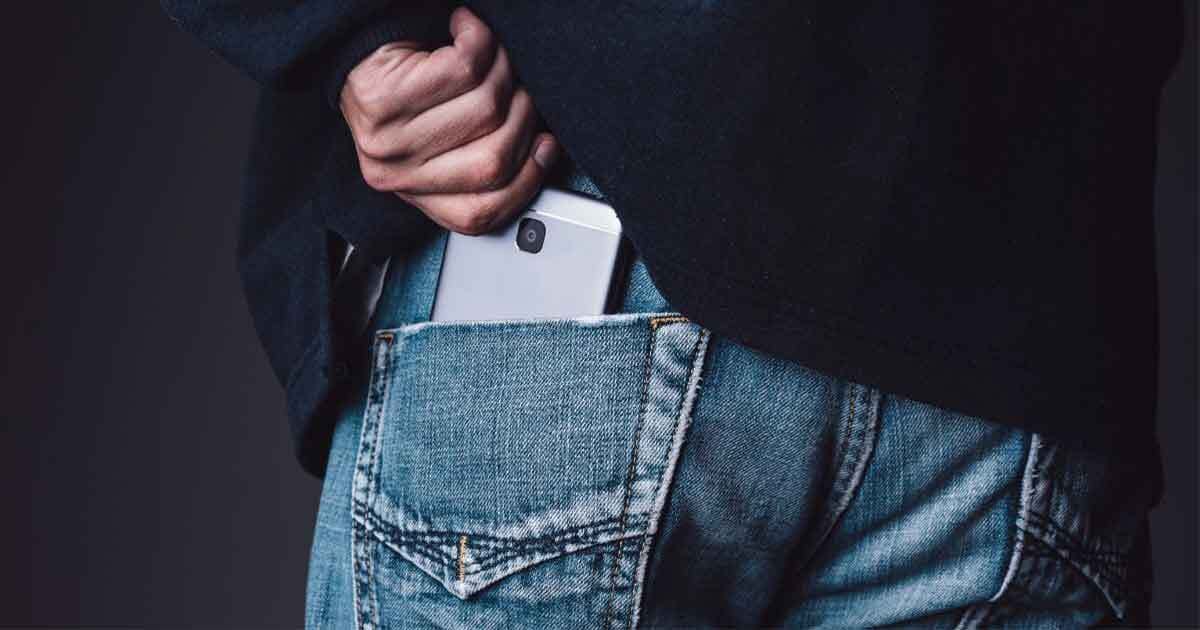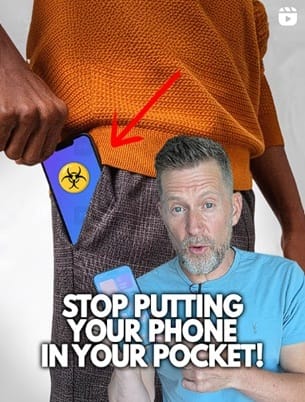There’s one habit most of us have on autopilot: sliding our phones into our pockets without a second thought. It’s part of the routine: keys, wallet, phone, and go. But what if that tiny device did more than ride along for the day? This week, we’re digging into one of the most overlooked (and close-to-home) sources of chronic exposure: your phone in your pocket.
In our latest post, we explain why this matters, from real reproductive health concerns to subtle skin issues and long-term organ stress. Even major tech companies quietly admit that keeping your phone on your body isn’t ideal. Science is catching up with the warnings: studies are finding links between RF radiation and reduced sperm quality, hormone disruption, and oxidative stress.
Swapping out plastic containers or starting to use cleaner household products is one more layer of protection you can add. We’ll give you the lowdown, the science, and simple steps to stay connected without putting your health on the line.
You’re invited to read the full breakdown below.
Toxin Awareness
“Swimming Pool Syndrome” Is Real
Ever slather your kids in coconut oil before a pool party?
Turns out, you were onto something…
Chlorine and other pool chemicals get absorbed straight into the bloodstream.
This article breaks down how to protect your family.
Blog Spotlights
Why You Should Stop Carrying Your Phone in Your Pocket
There are a few habits so baked into our daily lives that we barely think about them anymore. Carrying a phone in your pocket is one of them. It’s second nature. We grab our keys, wallet, and phone, slide the phone into our front or back pocket, and go about our day. But this convenience comes with a hidden cost that could quietly impact your health…
How to Keep Your Produce Fresh Longer
You’re not alone if you’re tossing out cucumbers, wilted herbs, or half-eaten avocados every week. It’s easy to underestimate how much money is slipping through your fingers when produce goes bad before you can eat it…
A Yoga Mat in Your Bread? Hidden Toxin Alert
Bread is one of the most basic, comforting foods around. Whether it’s toast in the morning, a sandwich at lunch, or a dinner roll with your evening meal, it’s easy to forget how much of it we eat until you start paying attention. But here’s the problem: not all bread is created equal…
The Hidden Toxins in Costco’s Dishwasher Detergents
Shopping at big-box retailers like Costco is all about efficiency. You get the value of bulk pricing, a wide selection, and the convenience of picking up everything you need in one trip. But when it comes to home products like dishwasher detergent, it’s essential to look past the marketing and dig into what’s in the products lining the shelves. That bulk pack might save you money at the register, but if it’s loaded with toxins, it could cost you other ways…
Non-Toxic Tip of the Week
Create a Low-EMF Home Zone
Wi-Fi routers, laptops, smart TVs, Bluetooth speakers, baby monitors, and EMFs are everywhere. But you can reduce your exposure with a few smart shifts.
This week, try creating a Low-EMF Zone at home by:
Turning off your Wi-Fi router at night (use a timer plug for convenience)
Use wired ear buds instead or Wireless
Using wired internet connections (Ethernet > Wi-Fi) when possible
Avoiding laptop use directly on your body, use a table or lap desk
Disabling Bluetooth on devices when not in use
Keeping wireless devices out of bedrooms, especially while sleeping
These tiny tweaks can reduce your cumulative exposure significantly, especially during rest and recovery times.
Less EMF = less biological stress. Make your home a calmer, cleaner energy space.
Non-Toxic Recipe of the Week
DIY Lemon Electrolyte Refresher
Proper hydration is essential as summer temperatures soar. However, store-bought sports drinks often contain artificial ingredients that do more harm than good.
This week, we’re sharing a clean and refreshing alternative: a homemade Lemon Electrolyte Refresher. It’s simple, effective, and supports hydration, detox, and energy, without the junk.
Do you have a shelf full of extra books, or are you diving into homeschooling this year? There’s a free webinar worth checking out. Luke, co-founder of Book Profits, walks through three straightforward ways to turn those unused books into steady online income. No tech experience required. It’s an innovative, low-effort way to earn extra cash and support your non-toxic living goals. Reserve your free spot here.
This Week on Social Media, I talked about:
Thanks for reading this week’s newsletter. This time, we explored ways to keep your produce fresh longer, uncovered hidden toxins in Costco’s dishwasher detergents, revealed the surprising presence of yoga mats in bread, shared how to prepare your homemade Lemon Electrolyte Refresher, and provided practical tips to reduce EMF exposure at home. Small changes in these everyday areas can add to a healthier, less toxic life for you and your family.
Take what works for you, and know we’re here to help you navigate the non-toxic path. See you next week!
*Not what you're looking for? Go to the HTML version for the fancy stuff and content. OR: I need to ask you something.. How tightly are you holding on? Now don’t just answer with your mind. Feel it. Feel the grip inside of you, the tension, the way your heart clings to things, the way your mind grabs at control. I’m asking because this story is about letting go. Not in theory—not as some idea to think about. But as something to do. Right now. Let me explain. There was a man who lived his life as if he were holding on to a rope. The rope was long and frayed, tied to all the things he thought he needed to survive. He gripped it with both hands and held on for dear life. He thought that if he let go, he would fall into an abyss. He didn’t know exactly what was down there, but he knew it would be bad. He’d lose everything—his family, his job, his sense of self. Without the rope, he was certain, he would be nothing. But holding the rope was exhausting. It burned his palms and cut into his fingers. Sometimes it felt like the rope pulled him in different directions at once—one end tied to his need for people to like him, the other to his fear of failure. Sometimes the tension on the rope was unbearable, but still, he held on. Because to let go? That was unthinkable. One day, the man met an old woman sitting on a bench in a park. She had a peaceful glow about her, as if she carried no burdens at all. The man was jealous of her ease. He couldn’t remember the last time he’d felt that way. “How are you so calm?” he asked her. The woman looked at him and smiled. “I let go of the rope,” she said simply. The man frowned. “What rope?” “The one you’re holding,” she said. “You can’t see it, but you can feel it, can’t you? That tightness inside of you. That fear that if you let go, you’ll lose everything. But the truth is, the rope isn’t saving you. It’s strangling you.” The man was quiet for a long time. He didn’t know what to say. He didn’t even know how to imagine a life without holding on to the rope. “But if I let go,” he said finally, “won’t I fall?” The woman’s smile deepened. “That’s what you think,” she said. “But the only thing you’ll fall into is freedom.” The man didn’t believe her, of course. How could he? Letting go went against everything he’d been taught. He’d spent his whole life being told that survival depended on holding on—holding on to people, to possessions, to control. Letting go felt like giving up. It felt like failure. So I ask you again: How tightly are you holding on? Can you feel the tension in your chest, the grip in your heart? And more importantly, can you let it go? You don’t have to do it all at once. Just open your hands a little. Just loosen the grip. And when you do, you’ll find that you’re not falling. You’re floating. You’re free. Let go of the rope. Trust me. You don’t need it. The Labyrinth of Light The dome was a living sun. Its translucent panels, segmented like a beetle’s shell, refracted the noonday radiance into a thousand glittering shards, each shard sliding and shimmering along the smooth, white walls below. Everything gleamed with antiseptic brightness, unmarred by the stains of weather, time, or emotion. This was Aurorium, the City of Light. It had no shadows, and, officially, no doubts. Here, under the ever-shining dome, humanity had left behind its fumbling uncertainties, its endless agonies of self-questioning. Gone were the abstract struggles of philosophers and the ceaseless murmur of poets. In their place stood the Ministry of Illumination, with its shining creed: “Meaning is not found—it is assigned. Meaning is not sought—it is delivered.” At the Ministry, every citizen was given their Lumen Pathway by the time they reached their eighteenth year. The system was flawless, or so the Ministry claimed. Each person’s psychometric profile was carefully analyzed; their neural maps scanned and cross-checked against the Collective Consciousness Index. By the end of the process, the result was inevitable: a tailored life-purpose, as precise as the color of one’s irises or the number of lines on one’s fingerprints. And yet, here was Elias. Elias Lorne, Citizen #71184-17, stood at the base of the Ministry’s grand atrium, staring at his Lumen Certificate. The holographic display shimmered faintly in the sterile air, the words inscribed in perfect golden light: "Your purpose is to tend the Reservoirs of Radiance." The Reservoirs. He had heard of them—a vast network of subterranean pools where the city’s refractive crystals were immersed and cleansed, their radiance replenished to ensure the eternal glow of Aurorium. It was honorable work, no doubt, necessary for the city’s unbroken illumination. And yet, as he stood there, holding his future in his hands, something in Elias’s chest remained unmoved. “Is this all there is?” he murmured under his breath. Behind him, a low hum of activity filled the atrium. Young citizens, fresh from their assignments, buzzed with nervous energy. Some smiled, others wept with joy at the clarity of their destinies. A girl beside him held her certificate like a talisman, her voice trembling as she whispered, “I’ll be a Vision Architect!” Another boy punched the air triumphantly, announcing to no one in particular, “Harmonic Technician. Exactly what I wanted!” Elias’s fingers tightened around the edge of the hologram. It wasn’t that he objected to the assignment—not exactly. He understood the necessity of the work. But somewhere deep in the cavernous recess of his mind, a quiet question flickered like a match held too close to the wind: Wasn’t there something more? The next morning, Elias descended into the Reservoirs. “Dangerous?” “Restlessness is a crack,” Mara said. “And cracks are where the darkness seeps in.” Elias hesitated. Then, without meaning to, he said: “Do you ever feel like there’s something missing?” For a long moment, Mara was silent. Then, to Elias’s surprise, she smiled. “Come with me,” she said. That night, Mara led Elias to a hidden passage at the edge of the Reservoirs. The corridor was narrow and dim, its walls streaked with stains of rust. At the end of the tunnel was a door, heavy and ancient, unlike anything Elias had seen in Aurorium. Mara pushed it open. Inside was darkness. Not the faint, shimmering darkness of the city’s shadowless corners, but a true, unbroken blackness that swallowed light whole. For a moment, Elias was overwhelmed by it. The silence was absolute, the void pressing against his skin like a living thing. “What is this place?” he whispered. Mara’s voice was quiet, reverent. “This is where the light comes from.” Elias frowned. “What do you mean? The light comes from the crystals.” Mara shook her head. “The crystals only reflect it. But the source—the true source—is here. In the dark.” She gestured toward the center of the room. There, faintly visible, was a single point of light, no larger than a grain of sand. It pulsed softly, irregularly, like the heartbeat of some distant, unseen creature. “The Ministry doesn’t talk about this,” Mara continued. “They want people to believe the light is infinite, self-sustaining. But it’s not. It comes from here. And it’s fragile.” Elias stared at the tiny light, his chest tightening. “Why are you showing me this?” “Because you’re asking questions,” Mara said simply. “And questions can’t be answered in the light. Not the real ones.” In the weeks that followed, Elias found himself drawn back to the dark room. He spent hours staring at the tiny light, his thoughts unraveling in its faint glow. What was it about the darkness, he wondered, that made the light seem so alive? In the Reservoirs, surrounded by radiance, the light had felt hollow, artificial. But here, cradled in shadow, it was different—fragile, imperfect, and undeniably real. Perhaps, Elias thought, meaning wasn’t something the Ministry could assign after all. Perhaps it wasn’t something that could be given at all. Perhaps meaning had to be carved out of the dark.












